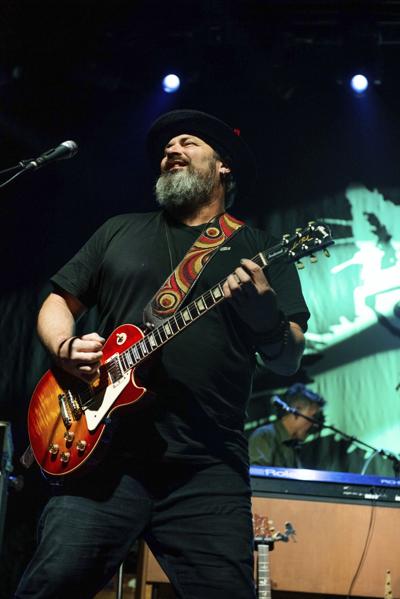Music harps the cords of our humanity at a depth so far within and so hard to reach. These are the top 10 bands who sold the most records.
Blues Traveler will hit Pinewood Bowl on Monday along with Big Head Todd and the Monsters, a pairing that reunites the two bands that began playing shows together three decades ago.
"It’s going to be a blast," said Blues Traveler guitarist Chan Kinchla. "We’ve known Todd for 30 years. Big Head Todd and the Monsters were on a few of the original H.O.R.D.E tours and we’ve played with them in a lot of different forums. We get along great and the music is different enough that it really works."
Blues Traveler founded the H.O.R.D.E. Festival in 1992, when the band was starting to sell albums and regularly appearing on "Late Night with David Letterman," becoming one of the most popular of what has come to be called jam bands.
"We kind of came up before that was a term," Kinchla said. "In the late ’80s, there was us, Widespread Panic and Phish on the East Coast. They called us neo-hippies back then. We were more rock 'n' roll. But we did improvise live. Our studio efforts were more controlled and focused.
People are also reading…
"In the late ’90s, that term came up and it didn’t completely fit. We don’t really fit any category — are we pop, rock 'n' roll, a jam band? But live, we definitely stretch it out and improvise a lot more, so maybe it fits."

Chan Kinchla of Blues Traveler performs in Atlanta in 2019.
The band’s latest release is 2021’s "Traveler’s Blues." Recorded during the pandemic, the album features guests like Warren Haynes, Keb' Mo' and Christone "Kingfish" Ingram joining the band on a set of songs that includes the classic "Ball & Chain," Jimmy Reed’s "You Got Me Runnin’," The Doors’ "Roadhouse Blues" and Son Seals’ "Funky Bitch."
"It’s the blues album we always wanted to make back in high school, but we couldn’t," Kinchla said. "We were kids and we kind of quickly evolved into our own kind of rock band. Now we’ve got a Grammy-nominated blues record. We proved we can play some decent blues."
Blues Traveler didn’t win the traditional blues Grammy last year. But it did show that they can play the straight-up blues, no jamming allowed.
"We made it a point to keep it on the form because with Blues Traveler, we’ll just keep going until it's back to Blues Traveler," Kinchla said. "We went back to the original recordings of the songs and used those as our boilerplate. They’re a little more loosey-goosey live. But we still stay pretty close to the originals."
There will likely be a song or two from "Traveler’s Blues" in Blues Traveler’s set Monday. But it won’t be dominated by material from that or any other Blues Traveler album.
"You gotta bring the hits, especially if it’s a cross-section gig," Kinchla said. "If it’s a theater for just our fanatics, maybe not. But you don’t want to go see a band you’ve spent a bunch of money on and not hear the hits.
"That’s only 20 minutes, for us. And so you’ll see some new stuff, some blues stuff. We’re always doing a different set every night. But to be honest, we can only do so many songs, otherwise you can’t really remember them. So we’ve got about 25 songs in working form."
None of those 25 songs will sound the same each time it’s played on tour. But that’s one of the reasons that Blues Traveler goes out to play.
"Playing live, that experience is what we always wanted to do, play live in front of a great crowd, improvise and have fun," Kinchla said. "That’s part of the reason we’ve stayed together for 35 years. No matter what’s happened in the business, the ups and downs, we’ve always gone back to playing live shows and having fun. That’s what’s kept us going."
Blues Traveler goes back to Princeton, New Jersey, where harmonica player and singer John Popper, Kinchla and bassist Bobby Sheehan got together to jam in the basement of drummer Brendan Hill’s parents' house.
Initially calling themselves The Establishment, the teenagers changed their name to Blues Traveler, then, after graduating from high school, ventured 50 miles northeast to New York City, where they were supposed to be going to college.
But they were really playing the club circuit, where they were discovered and signed by A&M Records. They dropped out of school, started making records and touring — and never stopped.
"Basically, I’ve spent my entire life in my high school band," Kinchla said. "I get more and more of a kick out of it, that I can say that. It’s all the original surviving members. The fact we did kind of grow up together creates some bonds that go beyond just being in a band together. We’re like brothers. We get along as well now as we ever have. We have to come to grips with the idea that we’re never going to break up."
That high school band’s first three albums — 1990’s "Blues Traveler," 1991’s "Travelers and Thieves" and 1993’s "Save His Soul" — all went gold. Then came "Four" in 1994 — a six-times platinum smash that included the Grammy-winning hit "Run-Around." And the rest is history that, Kinchla said, leaves the band, which isn’t about to slow down, with an ongoing legacy.
"We wrote a lot of great songs. We kind of brought back in the improvisation after all the classic ’70s rock and played a lot of great shows. I’m really proud we managed to stay together. Look at Paul McCartney: I’m sure he doesn’t need the money, but you can’t drag him off the stage. We’re like that. We’ll keep going until the wheels come off."
Photos: Pinewood Bowl Concerts
Photos: Pinewood Bowl Concerts

David Crosby of Crosby, Stills & Nash performs on Wednesday, Aug. 8, 2012 at Pinewood Bowl.
Photos: Pinewood Bowl Concerts

Lynyrd Skynyrd performs at Pinewood Bowl on Aug. 2, 2014, at Pioneers Park.
Photos: Pinewood Bowl Concerts

Jack Black of Tenacious D (right) flips his hair while performing on Sunday, July 28, 2019, during Post-Apocalypso The Tour at the Pinewood Bowl.
Photos: Pinewood Bowl Concerts

Blues legend B.B. King in performance on Thursday, August 16, 2012 at the Pinewood Bowl at Pioneers Park.
Photos: Pinewood Bowl Concerts

Former Beatles drummer and two-time Rock and Roll Hall of Famer Ringo Starr laughs at a comment he made to the audience on Saturday, June 25, 2016, during a concert at the Pinewood Bowl Theater.
Photos: Pinewood Bowl Concerts

Twenty One Pilots vocalist/bassist Tyler Joseph (right) and drummer Josh Dun perform on Thursday, July 28, 2016, during a sold out show at the Pinewood Bowl Theater.
Photos: Pinewood Bowl Concerts

"Weird Al" Yankovic performs his zany brand of musical parody before an audience on Wednesday, Aug. 10, 2016, at the Pinewood Bowl Theater.
Photos: Pinewood Bowl Concerts

The first concert of the summer at the Pinewood Bowl featured a triple bill of Willie Nelson, Dwight Yoakum, and Robert Earl Keen (seen here in performance) on Wednesday, June 7, 2017. The originally scheduled first summer performance - by the group 1975 on May 19th - was moved to Pinnacle Bank Arena due to inclement weather.
Photos: Pinewood Bowl Concerts

The first concert of the summer at the Pinewood Bowl featured a triple bill of Willie Nelson, Dwight Yoakum, and Robert Earl Keen (seen here in performance) on Wednesday, June 7, 2017. The originally scheduled first summer performance - by the group 1975 on May 19th - was moved to Pinnacle Bank Arena due to inclement weather.
Photos: Pinewood Bowl Concerts

Country music legend Willie Nelson, seen performing at Pinewood Bowl in 2017, will return to the Pioneers Park amphitheater this summer along with The Avett Brothers.
Photos: Pinewood Bowl Concerts

Jim James of My Morning Jacket performs on Tuesday, August 8, 2012 at the Pinewood Bowl in Lincoln
Photos: Pinewood Bowl Concerts

My Morning Jacket performs on Tuesday, August 8, 2012 at the Pinewood Bowl in Lincoln
Photos: Pinewood Bowl Concerts

Guests gather at Pinewood Bowl in Pioneer Park for the performance "42nd Street" directed by Courtney Piccoli on Thursday, July 9, 2015.
Photos: Pinewood Bowl Concerts

Jerry Cantrell (right) and William DuVall (left) of Alice in Chains perform at the Pinewood Bowl Theater Friday, May 24, 2013, at Pioneers Park.
Photos: Pinewood Bowl Concerts

William DuVall of Alice in Chains performs at the Pinewood Bowl Theater Friday, May 24, 2013, at Pioneers Park.
Photos: Pinewood Bowl Concerts

Toby Keith performs Thursday, July 26, 2018 at Pinewood Bowl in Pioneers Park.








